Push begins for 4-year commissioner terms
 Initial hearings are possible next week in a Senate committee on a bipartisan pair of bills to enact four-year terms for county commissioners in Michigan.
Initial hearings are possible next week in a Senate committee on a bipartisan pair of bills to enact four-year terms for county commissioners in Michigan.
Senate Bill 242, by Sen. Ed McBroom (R-Dickinson), and SB 245, by Sen. Jeremy Moss (D-Oakland) would shift terms to four years, beginning with the 2024 presidential election cycle.
Through its policy platforms, MAC has long supported moving county commissioner terms to four years from the present two. Legislation to do this made good progress in 2020 but did not reach enactment.
Passage of these bills would end Michigan’s status as one of just five states with two-year terms on all commissioners. It’s time to end that dubious distinction and bring commissioner terms in alignment with the length of those for other county elected offices across our state.
The Senate bills are now before the Senate Committee on Local Government, chaired by Sen. Dale Zorn (R-Monroe).
“It’s important to make county voices numerous and loud as the Senate starts with these bills,” said MAC Governmental Affairs Director Deena Bosworth, “so we need members to help us now.”
First, MAC asks all commissioners to use our email advocacy tool on Monday, April 12 to send a message of support to senators. Commissioners will receive an email on Monday, through which they can send a pre-drafted message of support with just a couple of clicks.
Second, MAC asks county boards to approve a resolution in support of four-year terms. A template for this purpose can be on MAC’s website. MAC appreciates the early action of Genesee, Hillsdale and Marquette counties in adopting such resolutions. Once your county has approved the resolution, please send it to Hannah Sweeney at sweeney@micounties.org so that we can share with legislators.
For more information on this issue, contact Bosworth at bosworth@micounties.org.
 Podcast 83 goes live again on Monday, April 12
Podcast 83 goes live again on Monday, April 12
The Podcast 83 team returns on Monday for another live session to report on activity in Lansing and Washington, D.C., that affects Michigan’s 83 county governments and the people they serve.
Click here to register for the live event, which will include a Q&A session on all of the hot legislative topics. The episode starts at 3 p.m. on Monday, April 12.
Members can view any previous episode of the podcast, sponsored by DTE Energy, on the podcast webpage.
National leaders to headline conference session
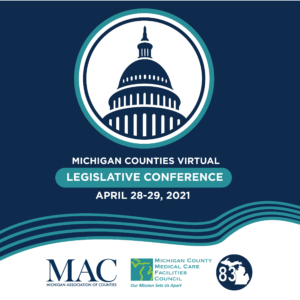 The top two leaders for the National Association of Counties (NACo) will provide a special briefing on the American Rescue Plan (ARP) and the $65.1 billion in direct aid to U.S. counties during an April 29 Plenary session of the 2021 Michigan Counties Legislative Conference.
The top two leaders for the National Association of Counties (NACo) will provide a special briefing on the American Rescue Plan (ARP) and the $65.1 billion in direct aid to U.S. counties during an April 29 Plenary session of the 2021 Michigan Counties Legislative Conference.
NACo President Gary Moore of Boone County, Ky., and CEO/Executive Director Matt Chase will discuss the ARP and NACo’s targeted strategy for the implementation of this once-in-a-lifetime investment in county government.
This is just one of several plenary and workshop sessions that will provide practical information on issues of urgency to Michigan county leaders.
The conference is just three weeks away now. County officials are urged to register by April 14 to get the best rate for the two-day event.
Remember, all conference events are included in your single conference fee, which is now just $100 if you are a member of MAC or the Michigan County Medical Care Facilities Council.
MAC joins coalition on housing affordability
 MAC recently joined a diverse group of entities to form the Housing Michigan Coalition. The coalition consists of community, business and government organizations that support increasing housing supply and affordability.
MAC recently joined a diverse group of entities to form the Housing Michigan Coalition. The coalition consists of community, business and government organizations that support increasing housing supply and affordability.
The coalition’s primary focus will be to advocate for legislation creating and expanding tools for local governments to support the development or rehabilitation of housing supply that is attainable to more of our citizens.
Legislation is being crafted to:
- Allow municipalities to develop payment in lieu of taxes agreement with developers who are building or rehabbing affordable housing units
- Provide employers who contribute towards the housing of employees that make up to 120 percent of AMI (area median income) an income tax credit up to 50 percent of the total eligible contributions
- Authorize an “attainable housing district” where property owners can apply for partial tax exemptions if they meet certain affordability criteria determined by the local government
A full list of the drafted proposed legislation can be found here.
MAC expects bills to be introduced next week when the Legislature returns to Lansing.
Governor creates Task Force on Forensic Science
 A new Executive Order from Gov. Gretchen Whitmer creates a Task Force on Forensic Science “to study issues related to forensic science and provide recommendations to strengthen the use of forensic science in Michigan’s criminal justice system.”
A new Executive Order from Gov. Gretchen Whitmer creates a Task Force on Forensic Science “to study issues related to forensic science and provide recommendations to strengthen the use of forensic science in Michigan’s criminal justice system.”
The task force will be an advisory body under the Michigan Department of State Police and be comprised of medical practitioners, legal professionals, government officials, academics and private sector experts. Co-chairs of the task force will be Director Col. Joseph Gasper of the Michigan State Police and Chief Justice Bridget Mary McCormack of the Michigan Supreme Court.
The task force’s mission is to review the state of forensic science in Michigan and deliver their completed findings and policy recommendations to the governor no later than Dec. 31, 2021. The findings will recommend, among other pieces, methodology improvements, processes to address misconduct and procedures to update stakeholders on developments in forensic science.
A list of current members can be found here.
Deadline approaches on Hometown Health award nominations
 The Michigan Public Health Week Partnership is still seeking nominations of individuals and organizations that have made significant contributions to preserve and improve their community’s health for its annual Hometown Health Hero awards.
The Michigan Public Health Week Partnership is still seeking nominations of individuals and organizations that have made significant contributions to preserve and improve their community’s health for its annual Hometown Health Hero awards.
Deadline for nominations is April 26.
Hometown Health Hero awards are presented every spring as part of Michigan Public Health Week.
Nomination forms can be downloaded from www.michigan.gov/mphw. Completed nominations should be sent to Jim Koval via email at kovalj@michigan.gov or faxed to 517-335-8392.
Winners will be announced by the week of May 9, which will be Public Health in Michigan Week.
Redistricting Commission sets public hearings for May, June
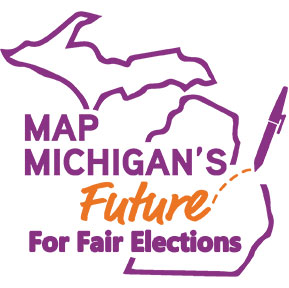 The Michigan Independent Citizens Redistricting Commission (MICRC) has set its first series of public hearings for its work to redraw political lines for the 2022 elections.
The Michigan Independent Citizens Redistricting Commission (MICRC) has set its first series of public hearings for its work to redraw political lines for the 2022 elections.
The public hearings will run from 5 p.m. to 9 p.m. and are currently set for virtual sessions, though that is subject to change as the pandemic health orders change. Locations and dates are:
- May 11 – Jackson
- May 13 – Kalamazoo
- May 18 – Marquette
- May 20 – Gaylord
- May 25 – Midland
- May 27 – Lansing
- June 1 – Flint
- June 3 – Pontiac
- June 8 – Novi
- June 10 – Dearborn
- June 15 & 17 – Detroit
- June 22 – Port Huron
- June 24 – Warren
- June 29 – Muskegon
- July 1 – Grand Rapids
Please note, the Independent Redistricting Commission will draw district lines for state legislative and federal congressional districts. The lines for county commissioner districts are handled by county Apportionment Boards. For details on the apportionment process, click here or attend a special workshop at the 2021 Michigan Counties Legislative Conference.
 Staff picks
Staff picks
- Upper Peninsula Energy Task Force Recommendations (Department of Environment, Great Lakes and Energy)
- How states can help localities better respond to pandemic-related fiscal strains (Pew Trusts)
- States tap federal CARES Act to expand broadband (Pew Trusts)
- Suez Canal: How did they move the Ever Given? (BBC News)
Legislative Roundtable at conference will feature House, Senate leaders
 A Michigan Counties Legislative Conference always features in-depth briefings on what’s going on in Lansing – and this year’s virtual version is no different.
A Michigan Counties Legislative Conference always features in-depth briefings on what’s going on in Lansing – and this year’s virtual version is no different.
MAC Executive Director Stephan Currie will moderate a Legislative Roundtable with four key members of the Michigan Legislature:
- House Speaker Jason Wentworth (R-Clare)
- Senate Majority Leader Mike Shirkey (R-Jackson)
- House Minority Floor Leader Yousef Rabhi (D-Washtenaw and a former county commissioner)
- Sen. Curtis Hertel, Jr. (D-Ingham and a former register of deeds)
During a session to be taped in late April for broadcast on day 2 of the conference, Currie and the legislators will discuss COVID funding, the prospects for reform of local government finance, four-year terms for county commissioners and much more. (If you wish to propose a question for the panel, please send it to MAC’s Hannah Sweeney at sweeney@micounties.org by April 12.)
The conference is just four weeks away now. County officials are urged to register by April 14 to get the best rate for the two-day event.
Remember, all conference events are included in your single conference fee, which is now just $100 if you are a member of MAC or the Michigan County Medical Care Facilities Council.
MDHHS modifies attendance limits; counties should review OMA requirements
 Changes to how county and other public boards hold public meetings will result now that the Michigan Department of Health and Human Services has modified attendance restrictions in its COVID-19 health orders.
Changes to how county and other public boards hold public meetings will result now that the Michigan Department of Health and Human Services has modified attendance restrictions in its COVID-19 health orders.
The revisions, made Wednesday afternoon and carrying immediate effect, would have the following effects on meetings governed by the state’s Open Meetings Act:
- Remove restrictions that would limit the number of people to 25 at a public meeting being held under the OMA
- Now that the blanket exemption for holding meetings remotely is expiring, meetings of public bodies can be held remotely only in certain circumstances, including where a state of emergency (SOE) or state of disaster is declared (MAC has been tracking counties with SOE declarations; as of Thursday, our records showed 55 responses, with 39 of those either with an SOE or planning one)
- Public bodies that have NOT declared a state of emergency, meeting in-person may now be required to conduct public business in accordance with the OMA
- Participants at in-person public meetings are required to comply with other provisions in the order, including wearing masks and limiting the number of people at the meeting based on the venue size
For the latest COVID news affecting county government, visit MAC’s Resources Page.
See your senator on street? Tell ’em about 4-year term bills
 Through its policy platforms, MAC has long supported moving county commissioner terms to four years from the present two. Legislation to do this made good progress in 2020 but did not reach enactment.
Through its policy platforms, MAC has long supported moving county commissioner terms to four years from the present two. Legislation to do this made good progress in 2020 but did not reach enactment.
We are back at work this year, though, with new bipartisan bills — Senate Bill 242, by Sen. Ed McBroom (R-Dickinson), and SB 245, by Sen. Jeremy Moss (D-Oakland) — to bring four-year terms to Michigan, beginning with the 2024 presidential election cycle.
With legislators at home for their spring break, now is an excellent time for county leaders to pitch them on the value of extending commissioner terms.
For example, Passage of these bills would end Michigan’s status as one of just five states with two-year terms on all commissioners. It’s time to end that dubious distinction and bring commissioner terms in alignment with the length of those for other county elected offices across our state.
For additional talking points, view MAC’s resolution template for four-year terms legislation. (Also, if your county has not yet approved such a resolution, please do so and send a copy to Hannah Sweeney at sweeney@micounties.org as soon as possible.)
The Senate bills are now before the Senate Committee on Local Government, chaired by Sen. Dale Zorn (R-Monroe). The committee is expected to start hearings on the legislation during the week of April 12. It’s important to get these bills moving early in the year, so please let your senator now your thinking on this issue.
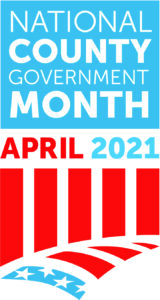 National County Government Month is under way
National County Government Month is under way
“Counties Matter” is the theme of the 2021 National County Government Month (NCGM). Since 1991, the National Association of Counties (NACo) has encouraged counties to actively promote the services and programs they offer. Counties can schedule activities any time during the month. NCGM is an excellent opportunity for your county to highlight effective county programs and raise public awareness and understanding about the various services provided to the community.
MAC is proud to partner with NACo and other county associations around the U.S. to honor public servants in county government and highlight the work they do to make our communities great places to live.
MAC has created a resources page for counties looking for ideas to promote their work. And we will be featuring #NCGM on our Twitter account and our Facebook page throughout April.
MAC joins letter of concern on 911 fee changes
 MAC joined with the Michigan Communication Directors Association (MCDA) this week on a letter to the state’s congressional delegation in opposition to a federal plan to alter the use of fees for 911 services.
MAC joined with the Michigan Communication Directors Association (MCDA) this week on a letter to the state’s congressional delegation in opposition to a federal plan to alter the use of fees for 911 services.
In the letter, the two organizations warn members of Congress, “The (Federal Communications Commission’s) proposed rules could impinge upon Michigan’s ability to determine the definition of allowable costs for 911 fees. The federal proposal eliminates radio system equipment beyond the consoles in the 911 center, i.e., radio infrastructure, mobiles, portables, pagers, AVL (Automatic Vehicle Location) and MDCs (Mobile Data/In-Car Computer) would no longer be allowable costs.”
The letter asked for congressional help in dealing with the proposal to ensure Michigan’s 911 system isn’t harmed.
For more information on this issue, contact MAC’s Meghann Keit-Corrion at keit@micounties.org.
Keep eye out for survey of county officials by CLOSUP
 An invitation to participate in the Michigan Public Policy Survey (MPPS) program is coming soon to your mailbox.
An invitation to participate in the Michigan Public Policy Survey (MPPS) program is coming soon to your mailbox.
The MPPS is a state-wide survey of local government officials conducted since 2009 by the University of Michigan in collaboration with MAC, the Michigan Townships Association and the Michigan Municipal League.
On Monday, April 5, you will receive an email link to the new MPPS questionnaire, which asks about your county’s fiscal health, as well as your insights about the local impact of the COVID-19 pandemic, your jurisdiction’s use of online technology and the functioning of democracy.
The MPPS studies don’t just end up on someone’s shelf — they are used by legislators, the media, the public and government officials to better understand what local leaders like you feel is really important, right now. Your participation is crucial to the success of the MPPS program.
Reports and data from previous MPPS surveys can be found on the MPPS website: http://mpps.umich.edu.
If you have questions about this research study, you can contact Dr. Debra Horner, Center for Local, State, and Urban Policy, University of Michigan, 5309 Weill Hall, 735 S. State St., Ann Arbor, MI 48109, 734-615-5315, closup-mpps@umich.edu.
Late April sessions set for ‘Managing Mental Health Crisis’
 County officials are again invited to participate in additional webinar trainings on the nexus of mental health and public safety issues. The sessions, which are free thanks to the Michigan Department of Health and Human Services, run from 2 p.m. to 5 p.m. on the following dates:
County officials are again invited to participate in additional webinar trainings on the nexus of mental health and public safety issues. The sessions, which are free thanks to the Michigan Department of Health and Human Services, run from 2 p.m. to 5 p.m. on the following dates:
- April 21 – Mental Health Stigma, Mental Health Illness & Violence, Mental Illness and Disorders
- April 22 – Michigan Mental Health Code, De-Escalation, Mood Disorders
- April 28 – Trauma, Psychotic Disorders, Personality Disorders and Youth Interactions
- April 29 – Substance Use Disorder, Medications, Alzheimer’s, Neurodevelopmental Disorders, Excited Delirium, Recovery
This course is the equivalent of the 2-day classroom training. Participants must attend all four (4) sessions to receive a certificate. This course is approved by the Michigan Social Work Continuing Education Collaborative-Approval #111920-02. The Collaborative is the approving body for the Michigan Board of Social Work (12 CEs). Seats are limited to 47 participants.
Managing Mental Health Crisis is designed specifically for Michigan law enforcement, public safety and community mental health responders, endorsed by the state’s Diversion Council and MCOLES-approved.
Click here to register. Deadline is April 20.
For questions, contact J. Eric Waddell at jericwaddell@thecardinalgroup2.com.
 Staff picks
Staff picks
- America’s bald eagle population continues to soar (U.S. Department of the Interior)
- Can revenue from legalized recreational marijuana help states close budget gaps? (Pew Trusts)
- Five questions with Jon Beard about pups, pollution and policy (Public Sector Consultants)
- Northern Michigan child advocates discuss nationwide drop in child welfare, abuse reports (9&10 News)
Biden promises ‘flexibility’ on county investment funds
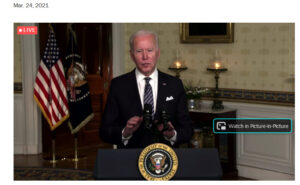 President Joe Biden said his administration is committed to flexibility in how counties utilize the $65 billion provided directly to them via the recently enacted American Rescue Plan.
President Joe Biden said his administration is committed to flexibility in how counties utilize the $65 billion provided directly to them via the recently enacted American Rescue Plan.
“County officials have a partner in my administration,” Biden added in an address to attendees of the National Association of Counties’ (NACo) Virtual Legislative Conference this week.
Biden’s remarks came just days before the start of National County Government Month in April, the annual celebration of the work of 3.6 million county public servants.
Staffs at MAC and NACo continue to gather information to aid the U.S. Treasury in developing guidelines and best practices on how counties can utilize the federal investment funds.
Michigan’s 83 counties alone will be receiving $1.95 billion.
NACo encourages county leaders to help them provide feedback to the U.S. Treasury on proper implementation of this huge investment by filling out a form with questions you have on allowable expenditures.
How to navigate meeting questions on multi-county entities
 MAC has fielded questions this week from members about how the provisions of the Open Meetings Act (OMA) and public health orders will affect the meetings of multi-county entities after March 31, 2021.
MAC has fielded questions this week from members about how the provisions of the Open Meetings Act (OMA) and public health orders will affect the meetings of multi-county entities after March 31, 2021.
First, it depends on a few factors (where the meeting would be held if in person, where individual members are, etc.). Here is a breakdown for the entity or individual members to meet virtually:
- If all counties that the entity covers declare a local state of emergency; or
- If the county that the entity meeting would be held in person declares one or the local municipality where the meeting would be held declares one; or
- If only one of the counties/municipalities declares a state of emergency only the members that reside in that geographic region may appear virtually if the meeting is being held in a county or municipality NOT under a state of emergency.
After March 31, 2021, it would be advisable when the meeting is called to order to indicate how the meeting is being held remotely (under which state of emergency), or if certain members only are appearing remotely, make sure they indicate which state of emergency is allowing them to appear in such a manner. Further, individual members may want to find out if their city, village or township has done the same for their individual options to appear remotely should they choose to do so.
For information on best practices for public meetings for county boards after March 31, 2021, click here.
Property tax exemptions on broadband head to governor
 Two bills that would offer exemptions from local property taxes on broadband equipment are on their way to Gov. Gretchen Whitmer’s desk, despite numerous concerns raised by MAC and others.
Two bills that would offer exemptions from local property taxes on broadband equipment are on their way to Gov. Gretchen Whitmer’s desk, despite numerous concerns raised by MAC and others.
Senate Bill 46, by Sen. Aric Nesbitt (R-Van Buren), and House Bill 4210, by Rep. Beth Griffin (R-Van Buren), are touted by supporters as removing an impediment to the expansion of broadband into unserved and underserved areas of the state by exempting this eligible high speed broadband equipment from personal property taxes if that equipment was installed after Dec. 31, 2020. For the exemption to apply, it must resolve a lack of broadband service and deliver at least 255 megabits per second (Mbps) downstream and three Mbps upstream for internet service.
Although MAC is supportive of the expansion of high-speed broadband service, we remained opposed to the legislation because there is no reimbursement mechanism for our revenue losses. The state is again not paying for their policy priorities because the exemption is not at the discretion of the county, but a mandated exemption.
For more information on this issue, contact Deena Bosworth at bosworth@micounties.org.
Materials Management Plans advance out of House committee

An eight-bill, bipartisan package rewriting the section of the Natural Resources and Environmental Protection Act that governs solid waste planning was passed out of the House Committee on Natural Resources and Outdoor Recreation this week. The committee, chaired by Rep. Gary Howell (R- Lapeer) took testimony on and voted out the same package of bills last session, but the bills died in lame duck. This session, they held two weeks of testimony and education on the issue and finally advanced the package to the House floor for consideration after spring break.
A significant amount of time, dedication and work has gone into this package by all of the stakeholders and the product that they voted out was based on an overall consensus. Not everyone is happy with the entire package, and there are a few issues that still need to be ironed out, but the package is a modernization of the statute which reflects an emphasis on materials management, sustainable disposal of waste and additional environmental protections.
MAC supports HB 4454-4461 in concept with just a few, but significant, reservations. …
Veterans legislation continues march through Legislature
 Improvements to efforts to aid Michigan’s 600,000-plus military veterans moved a step closer to enactment this week as a House committee advanced Senate Bill 10.
Improvements to efforts to aid Michigan’s 600,000-plus military veterans moved a step closer to enactment this week as a House committee advanced Senate Bill 10.
SB 10, by Sen. Lana Theis (R-Livingston), would allow county veteran service boards to meet in a closed session to interview a veteran, their spouse or a dependent regarding an application be benefits. This is meant to remove any concerns about a lack of privacy by veterans or their families seeking help, while maintaining public involvement and oversight. The veteran service committee would still be required to hold a vote to award grants in a public session. MAC supports SB 10.
Meanwhile, MAC-backed House Bill 4122, by Rep. Annette Glenn (R-Midland), was the subject of testimony in the Senate Families, Children and Veterans Committee from MAC and others this week. HB 4122 adapts state law to the realities of service delivery to Michigan veterans.
Among the MAC-supported changes in the House measure are:
- Allowing grant funds to be expended for direct financial assistance for an emergent relief program (as counties continue to navigate through COVID-19 response, ensuring proper care and resources for our veteran community will remain a priority)
- A 60-day window for the MVAA to distribute the grant, once approved by the county
- A limited reduction in the county maintenance of effort (MOE) requirement to support hard-pressed counties (counties are not able to reduce the funding and supplant the reduction)
- An exemption for the 20 hours per week staffing requirement, if approved by the Michigan Veterans Affairs Agency
Votes on both bills are expected in mid-April.
For questions, please contact Meghann Keit-Corrion at keit@micounties.org.
MAC testifies on indigent defense funding
 MAC spoke in support of continued and sufficient funding for counties to implement existing and upcoming indigent defense standards before a Senate appropriations panel this week.
MAC spoke in support of continued and sufficient funding for counties to implement existing and upcoming indigent defense standards before a Senate appropriations panel this week.
The Senate Appropriations Subcommittee on Licensing and Regulatory Affairs, chaired by Sen. Aric Nesbitt (R-Van Buren), oversees the nearly $500 million budget for the Department of Licensing and Regulatory Affairs, which includes the governor’s recommended $148 million line item to support Michigan Indigent Defense Commission (MIDC) grants that go in large part to counties to implement state mandates.
A $31.4 million increase sought in the governor’s budget will continue supporting standards 1-4 and the implementation of standard 5, which is due for compliance in county plans and costs analyses to the commission by April 27.
In their role of planning and managing indigent defense systems, counties continue to take great care with the public dollars entrusted to them, MAC told the panel. MAC also noted the work at the county level being done to streamline implementation of the defense standards.
While highlighting many successes throughout the new process, MAC also identified areas in which members have voiced concern. State law is intended to assure local control of these systems. However, many counties have struggled to see local control being implemented in a practical sense as the commission evaluates plans. If items are disapproved in plans, yet the county believes it is important to the effectiveness of the standards and defense, neither the grant nor local share can be used to support those disallowed costs. Counties then must go outside of their own local share money to a separate county general fund source.
MAC also emphasized the need to improve the grant reporting requirements and substantiating documentation. Counties from every corner of the state have voiced concern over the amount of back-up material requested on a regular basis. While general grant contract financial statements are welcomed, the additional paperwork and numerous requests by MIDC are becoming particularly burdensome. Isabella County Controller/Administrator Margaret McAvoy emphasized this point and provided information to the subcommittee on current county audit policies that ensure dollars are tracked responsibly.
A full video of the hearing can be found here.
For questions, contact Meghann Keit-Corrion at keit@micounties.org.
Diversity is one of many workshop topics at 2021 Legislative Conference
 The Michigan Counties Virtual Legislative Conference is barely a month away and preparations are accelerating on what we expect to be a unique and interesting event.
The Michigan Counties Virtual Legislative Conference is barely a month away and preparations are accelerating on what we expect to be a unique and interesting event.
County officials are urged to register by April 14 to get the best rate for the two-day event.
Among the 12 workshops designed for MAC members will be “Dispelling the Myths of Diversity, Equity and Inclusion (DEI) in County Work” on April 29.
Robyn Afryk, director of Ottawa County’s DEI Office and Roger Bergman, board chair of the county, will provide an overview of how Ottawa County established the first office of DEI in 2018 and brought it up to full strength in 2019. Come hear about the origins of the office, its current priorities and what the role of a commissioner looks like in this work.
Participants can expect time for a robust discussion and Q/A also.
MAC has designated the workshop for credit in its County Commissioner Academy (CCA), a professional development program for commissioners incorporating a series of events and workshops focused on the day-to-day responsibilities of a Michigan county commissioner.
Speaking of CCA, MAC will honor the first graduating “class” of “Certified” Michigan county commissioners during a Plenary session of the conference on April 29.
Remember, all conference events are included in your single conference fee, which is now just $100 if you are a member of MAC or the Michigan County Medical Care Facilities Council.
Ottawa’s Kuyers joins NACo Board of Directors
![]()
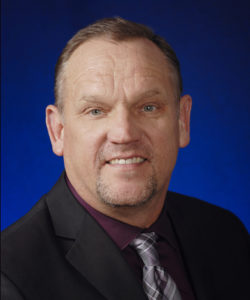 Ottawa County Commissioner Phil Kuyers was selected last week to serve on the Board of Directors for the National Association of Counties (NACo).
Ottawa County Commissioner Phil Kuyers was selected last week to serve on the Board of Directors for the National Association of Counties (NACo).
Kuyers, the first vice president on the MAC Board of Directors, replaces Ken Borton of Otsego County, who resigned his commissioner’s seat and all county roles at the end of 2020 to take his newly won seat in the Michigan House of Representatives.
“It’s a privilege to be appointed to the NACo Board,” Kuyers said. “My goals on the board are to have more insight for MAC and the counties of the state, and to offer input on the board in its policies and platforms in Washington.”
Kuyers was selected during a virtual meeting of the NACo Board on March 19.
Kuyers joins three other Michigan residents on the board:
- Veronica Klinefelt, MAC Board president and Macomb County commissioner
- Orrin Bailey, CFO of Kinexus, a workforce development organization
- Jayne Sabaitis, administrator of Maple Lawn Medical Care Facility, the county-owned skilled nursing facility in Branch County
 Podcast 83 goes live again on Monday, March 29
Podcast 83 goes live again on Monday, March 29
The Podcast 83 team returns on Monday for another live session to report on activity in Lansing and Washington, D.C., that affects Michigan’s 83 county governments and the people they serve.
Click here to register for the live event, which will include a Q&A session on all of the hot legislative topics. The episode starts at 3 p.m. on Monday, March 29.
Members can view any previous episode of the Podcast, sponsored by DTE Energy, on the podcast webpage.
Counties, check your figures on payroll reimbursements
 Counties that have applied for funds via the Public Safety and Public Health Payroll Reimbursement Program (PSPHPR) are asked to review their figures as soon as possible.
Counties that have applied for funds via the Public Safety and Public Health Payroll Reimbursement Program (PSPHPR) are asked to review their figures as soon as possible.
The PSPHPR Prorated Award Amounts as of March 23, 2021 listing is available on the Michigan Treasury’s PSPHPR website. Treasury is asking all PSPHPR applicants to review the listing. If a county applied for the program and they are not on the list, they need to notify Treasury by April 6.
If an applicant identifies an error or omission, please contact Treasury at 517-335-0155 or by emailing Treas-CARES@michigan.gov. Applicants must contact Treasury by Tuesday, April 6, 2021, with any concerns.
If an applicant does NOT identify an error, no further action is required to notify Treasury.
Please note the following regarding the PSPHPR Prorated Award Amounts as of March 23, 2021 listing:
- Prorated Award Amounts are not final.
- Treasury is in the process of completing final audits of the PSPHPR applications (affected applicants have been contacted).
- Awards will be finalized upon completion of the final audits and after the applicant’s review of the PSPHPR Prorated Award Amounts as of March 23, 2021 listing.
- Final Prorated Award Amounts are projected to be published in April 2021.
- The “Balance to Pay” amounts are the current projected amounts to be paid by Treasury to applicants.
- “Balance to Pay” amounts that are negative indicate that an applicant’s “Initial 50% Payment” was greater than the “Prorated Award Amount.”
- Once the prorated award amounts are finalized, applicants will need to repay the negative amounts. Do not repay the negative amounts until contacted by Treasury.
All amounts are subject to change. Any changes to one applicant will impact all other applicants’ amounts. Once Final PSPHPR Prorated Award Amounts are calculated, no further adjustments can be made.
Questions can be emailed to Treas-CARES@michigan.gov or by contacting the Treasury CARES Grant Program Hotline at 517-335-0155.
State seeks public input on housing plans
 The Michigan State Housing Development Authority (MSHDA) is undertaking a planning process to create a new strategic housing plan in Michigan. This is the first such effort in some years. A major push to get resident feedback has been to circulate an online survey instrument so that residents (renters, homeowners) and stakeholders (landlords and developers) can weigh in on their priorities and needs. The link to the survey is https://www.surveymonkey.com/r/MIHousingSurvey for English speakers.
The Michigan State Housing Development Authority (MSHDA) is undertaking a planning process to create a new strategic housing plan in Michigan. This is the first such effort in some years. A major push to get resident feedback has been to circulate an online survey instrument so that residents (renters, homeowners) and stakeholders (landlords and developers) can weigh in on their priorities and needs. The link to the survey is https://www.surveymonkey.com/r/MIHousingSurvey for English speakers.
This link will take you to a survey that takes about 10 minutes to answer which guides the respondent to the right questions (which change depending on whether one is a renter, homeowner, landlord or developer).
In addition to doing an online survey, respondents can complete a survey over the phone by calling 833-312-2002, M-F, 8 a.m. to 5 p.m.
Helpline staff are also working with a translation service provider to assist Michiganders who speak limited English.
For more information on this effort, visit www.michigan.gov/housingplan.
 Google offers free webinar on digital tools for your local economy
Google offers free webinar on digital tools for your local economy
A webinar designed for state and local leaders on digital tools for your community will be offered on Tuesday, March 30 from 1 p.m. to 2 p.m. EST.
The webinar is free and sponsored by Google.
“Whether constituents are looking to build a small business or find a new career, digital tools are helping Michiganders mitigate the challenges of the COVID-19 crisis, and are helping to enable a faster, stronger recovery,” Google said in announcing the session.
 Staff picks
Staff picks
- Michigan communities turn to wetlands to prevent damage during floods (Bridge Magazine)
- Waiting for a Crisis: Why criminal justice officials say the system has to change (WLNS-TV)
- County Comparisons data dashboard (Wayne State Center for Behavioral Health and Justice)
- Michigan warns of PFAS levels in Lake Superior rainbow smelt (MLive.com)
New bipartisan bills introduced for 4-year commissioner terms
 Through its policy platforms, MAC has long supported moving county commissioner terms to four years from the present two. Legislation to do this made good progress in 2020 but did not reach enactment.
Through its policy platforms, MAC has long supported moving county commissioner terms to four years from the present two. Legislation to do this made good progress in 2020 but did not reach enactment.
We are back at work this year, though, with new bills — Senate Bill 242, by Sen. Ed McBroom (R-Dickinson), and SB 245, by Sen. Jeremy Moss (D-Oakland) — to bring four-year terms to Michigan, beginning with the 2024 presidential election cycle.
Even as legislation stalled out last year, MAC had productive conversations with legislators on both sides of the aisle to address concerns and tweak the language.
Passage of these bills would end Michigan’s status as one of just five states with two-year terms on all commissioners. It’s time to end that dubious distinction and bring commissioner terms in alignment with the length of those for other county elected offices across our state.
The Senate bills are now before the Senate Committee on Local Government, chaired by Sen. Dale Zorn (R-Monroe).
To aid MAC in building momentum for passage, please consider a resolution of support by your county. MAC has created a downloadable template for this purpose. If your county does approve a resolution, please be sure to send a copy to sweeney@micounties.org.
For more information on this issue, contact Deena Bosworth at bosworth@micounties.org.
Time to register for 2021 Virtual Legislative Conference
 A quartet of Michigan’s top legislative leaders have been invited to keynote one of the Plenary sessions of the 2021 Legislative Conference, April 28-29.
A quartet of Michigan’s top legislative leaders have been invited to keynote one of the Plenary sessions of the 2021 Legislative Conference, April 28-29.
Registration is now open for the virtual-only event.
Members who register by April 14 will pay only $100 for all sessions; the price increases to $125 on April 15. Elected county clerks, prosecutors, registers of deeds, sheriffs and treasurers ARE eligible for the member rate. Non-members pay $150 for the event.
House Speaker Jason Wentworth (R-Clare), Senate Majority Leader Mike Shirkey (R-Jackson) and House Minority Floor Leader Yousef Rabhi (D-Washtenaw) are confirmed for the roundtable discussion, which will be taped in late April. A Senate Democratic member has not been identified. If you have questions for this panel, MAC is now collecting them. Submit your questions for the legislators to sweeney@micounties.org by April 14. Please put “quadrant question” in the subject line of your email.
The conference also will feature:
- Plenary addresses by National Association of Counties President Judge Gary Moore of Kentucky and Executive Director Matt Chase
- A Legislative Update on the 2021 session
- Twelve workshops tailored to MAC members and four for MCMCFC members
CE for MCMCFC members
The MCMCFC Workshops have been submitted to the Ohio Nurses Association (ONA) and National Association of Long Term Care Administrator Boards (NAB) for approval to award NHA continuing education credits and nursing contact hours.
MAC and MCMCFC appreciate the support of our “early-bird” sponsors: Blue Cross Blue Shield of Michigan, Enbridge, MMRMA, MAC Service Corp., Michigan Counties Workers’ Compensation Fund and Bradford Printing.
MAC-backed veterans bill clears House
 Another step forward in updating the county veteran service fund to reflect the realities of grant implementation and response to emergent relief efforts was taken this week as the House gave strong, bipartisan support to a MAC-backed bill.
Another step forward in updating the county veteran service fund to reflect the realities of grant implementation and response to emergent relief efforts was taken this week as the House gave strong, bipartisan support to a MAC-backed bill.
House Bill 4122, by Rep. Annette Glenn (R-Midland) reflects the work of MAC and the Michigan Veteran Affairs Agency (MVAA) to adapt statutory changes needed as experience identifies what structures work and what do not. Among the MAC-supported changes in the bill are:
- Allowing grant funds to be expended for direct financial assistance for an emergent relief program (as counties continue to navigate through COVID-19 response, ensuring proper care and resources for our veteran community will remain a priority)
- A 60-day window for the MVAA to distribute the grant, once approved by the county
- A limited reduction in the county maintenance of effort (MOE) requirement to support hard-pressed counties (counties are not able to reduce the funding and supplant the reduction)
- An exemption for the 20 hours per week staffing requirement, if approved by MVAA
MAC appreciates the support of members who used our Phone2Action system to send messages of support to their state representatives. The bill now moves to the Senate Families, Seniors and Veterans Committee, chaired by Sen. John Bizon (R-Calhoun).
For questions, contact Meghann Keit-Corrion at keit@micounties.org.
How to navigate questions on in-person vs. hybrid vs. digital
 With state health orders reducing restrictions on indoor gatherings and hospitalization rates showing marked improvement in recent weeks, MAC has been fielding questions from members about moving out of purely virtual county board sessions.
With state health orders reducing restrictions on indoor gatherings and hospitalization rates showing marked improvement in recent weeks, MAC has been fielding questions from members about moving out of purely virtual county board sessions.
First, it’s important to remember two key dates in play about board meetings:
- March 31, 2021 – This is the last day that public boards can hold virtual sessions for “any reason” under provisions of the October and December 2020 changes to the state’s Open Meetings Act (OMA).
- Dec. 31, 2021 – This is the last day that public boards can hold virtual sessions IF they have adopted a State of Emergency (SOE) resolution. A template for such a resolution is on MAC’s COVID Resources Page.
Next, boards must navigate the competing requirements of public access under OMA with the restrictions on gatherings under orders from the Michigan Department of Health and Human Services (no more than 25 persons) and/or local health departments.
Scenario 1: In person meeting with no declared state of emergency after 3/31/21
If your county wants to hold an in-person session and posts it as in-person at a physical address (say, the courthouse), the county may not turn away members of the public who arrive to attend the open meeting. Of course, this could lead to rooms exceeding proper capacity under COVID health orders.
One option is to plan for overflow room(s) with two-way communication for members of the public. However, absent the authority for a virtual meeting (e.g. state of emergency declaration after 3/31) requiring the public to leave because of the capacity limitations would violate the OMA.
Scenario 2: In person meeting with a declared state of emergency after 3/31/21
If, however, your county has a state of emergency declaration in place after 3/31 and posts the meeting as “virtual” or “hybrid” then it can proceed with some county personal (including commissioners) in the courthouse while the public is required to participate via two-way remote connections. This would also afford commissioners the option to participate in the meeting virtually.
That does not mean a posted in-person public meeting may not permit the public to participate via Zoom (absent a state of emergency declaration after 3/31) but permitting/encouraging/requesting virtual participation is different from requiring it or otherwise turning the public away from an in person meeting.
As always, county boards are advised to consult with their corporate counsel to ensure procedures are following all relevant state laws.
MDHHS modifies health order, eases sports attendance rules
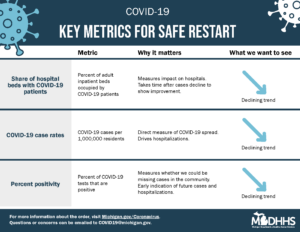 The Michigan Department of Health and Human Services (MDHHS) updated its Gatherings and Mask epidemic order, the department announced Friday, allowing up to 20 percent capacity in outdoor stadiums and arenas that establish infection control plans. The update also increases testing for youth ages 13-19 to ensure athletes can safely participate in sports. The changes to the Order go into effect Monday, March 22, and remain in effect through Monday, April 19.
The Michigan Department of Health and Human Services (MDHHS) updated its Gatherings and Mask epidemic order, the department announced Friday, allowing up to 20 percent capacity in outdoor stadiums and arenas that establish infection control plans. The update also increases testing for youth ages 13-19 to ensure athletes can safely participate in sports. The changes to the Order go into effect Monday, March 22, and remain in effect through Monday, April 19.
“More than 3.2 million doses of the safe and effective COVID vaccines have been administered in Michigan, and we are well on our way to vaccinating 70 percent of Michiganders ages 16 and up,” said Dr. Joneigh Khaldun, chief medical executive and chief deputy for health at MDHHS, in the departmental release.
MDHHS had been closely monitoring three metrics for stabilization or declines over the past several weeks. Michigan’s metrics have been increasing for the past few weeks. The presence of more infectious variants, such as the B 1.1.7 variant, threatens our progress in control of the epidemic and MDHHS will be monitoring data closely. In recent days:
- Positivity rate: has increased for four weeks to 6.2%. This metric is up 177% from the mid-February low but remains below the December high of 19.4%.
- Statewide case rate: This metric has increase over the past four weeks to 172.9 cases per million. The rate is up 77% from the low in mid-February but remains below peak of 737.8 cases per million on Saturday, Nov 14.
- Hospital capacity dedicated to COVID-19 is now at 4.9%. This metric peaked at 19.6% on Tuesday, Dec. 4 and is now up 25% from an end of February low.
And, to ensure consistency with recently issued CDC guidance, fully vaccinated individuals may now participate in residential gatherings with other fully vaccinated individuals without wearing a mask.
The latest information is available at Michigan.gov/Coronavirus and CDC.gov/Coronavirus. To learn more about the COVID-19 vaccine, visit Michigan.gov/COVIDVaccine.
 Staff picks
Staff picks
- One year into pandemic, these numbers frame Michigan’s uneven recovery (Bridge Magazine)
- Where Americans are moving — and why they really are doing it (Governing)
- So you want to do an infrastructure project? (Niskanen Center)
- Arctic walrus takes a nap on an iceberg, wakes up in Ireland (Livescience.com)
Massive federal aid plan wends way through Congress
 Two versions of a massive federal response to the ongoing COVID crisis are now in play on Capitol Hill. Passage of either version would mean hundreds of millions of dollars for Michigan counties.
Two versions of a massive federal response to the ongoing COVID crisis are now in play on Capitol Hill. Passage of either version would mean hundreds of millions of dollars for Michigan counties.
The version passed by the U.S. House, the American Rescue Plan, has an overall price tag of $1.9 trillion and includes $65 billion in direct aid to U.S. counties. Of that amount, Michigan would receive about $1.95 billion. (Click here to see an estimated distribution under the House-backed plan.) Both MAC and the National Association of Counties (NACo) have backed this plan.
Later in the week, however, Senate Democrats released a slightly different version of the aid plan, which would lower the direct aid to all counties to $60 billion, of which $1.8 billion would come to Michigan. (Click here to see an estimated distribution under the Senate plan.)
In each case, the aid moves directly to counties (unlike in prior federal rescue plans), is distributed based on population and goes to all counties, regardless of size. The Senate plan would allocate half the funds upfront, with the other half to be released within one year. The Senate version requires counties to spend the aid by December 2024.
NACo is working to include language that would prevent the states from taking away county money because we will get federal money.
The Senate plan also includes an extra $10 billion for water, sewer and broadband, with each state getting a base of $100 million and the rest distributed based on population, poverty rates and how rural a state is.
The Senate is expected to spend all of Friday on amendments to the spending plan. If the Senate clears the plan, as expected tonight or tomorrow, it will head back to the House next week for final approval.
For more information on this issue, visit NACo’s advocacy center.
State loosens restrictions on public gatherings; MAC gets detailed response on effects for county board meetings
 Gov. Gretchen Whitmer announced further loosening of state restrictions on public and economic activity due to the COVID pandemic during a Tuesday afternoon press conference.
Gov. Gretchen Whitmer announced further loosening of state restrictions on public and economic activity due to the COVID pandemic during a Tuesday afternoon press conference.
The orders come from the Michigan Department of Health and Human Services via its responsibilities under the Public Health Code.
“While we continue to have virus very present across the entire state, our improvements in case numbers, test positivity, and vaccinations mean we can move forward with reopening in an incremental way,” said Dr. Joneigh Khaldun, MDHHS chief medical executive and chief deputy for health. “I am glad we continue to make progress, but that progress is fragile. Everyone should continue to do important things like wearing a mask, washing hands, avoiding large gatherings and getting one of the three safe and effective vaccines when it becomes available to you.”
The changes, which take effect today and run through April 19, include:
- Indoor gatherings involving people from different households are allowed to have up to 25 people. (*See note below.)
- Restaurants and bars may have 50% indoor dining capacity, up to 100 people. Tables must still be six feet apart, with a max of six people at a table. A curfew on indoor dining is still in effect, but this order bumps it back from 10 p.m. to 11 p.m.
- Retail shops are allowed to operate at 50% indoor capacity, up from 30%.
- Indoor private residential gatherings are capped at 15 people from three separate households. Outdoor residential gatherings are allowed to have up to 50 people.
- Outdoor gatherings can resume with up to 300 people.
*MAC asked the Governor’s Office if public meetings or board meetings are permitted under this order?
MAC was told: “Yes, up to 25 board members may gather for a meeting. Under Public Act 254 of 2020, public meetings may be conducted virtually for any reason through March 31, 2021.
“The public may also attend the meeting in person subject to all applicable masking and distancing requirements. For public attendance to be permitted beyond 25 persons, the event must be designed to ensure that every person can avoid mingling or engaging in physical contact with persons from outside their household. For example, a reception larger than 25 persons would not be permitted indoors. All meetings covered by the Open Meetings Act – whether conducted virtually or in person – must also comply with Public Act 254 of 2020.”
With that in mind, MAC continues to advise counties to rely on virtual-only or hybrid virtual and in-person meetings to both comply with OMA and adhere to MDHHS orders and MIOSHA rules.
In related COVID news, Crain’s Detroit reported this week that MIOSHA, the state agency that oversees workplace safety and practices, is “very likely” to extend the ban on in-person office work beyond the current expiration date of April 14.
On the vaccination front, the state has updated its access calendar and announced that Michigan residents between the ages of 50 and 64 will be eligible for shots this month.
With all residents at skilled nursing homes having been offered their first dose of COVID-19 vaccine and a vast majority having had their second dose, the Residential Care Facilities Order goes into effect immediately. The order encourages communal dining and group activities for residents and allows indoor and outdoor visitation in all counties regardless of county risk level. Visitation is allowed as long as the facility has not had a new COVID-19 case in the last 14 days and all indoor visitors ages 13 and older are subject to rapid antigen testing.
As always, for the latest county-related news on COVID-19, visit MAC’s Resources Page.
Virtual Legislative Conference set for April 28-29
 Dates are now set for the 2021 Michigan Counties Legislative Conference: April 28-29.
Dates are now set for the 2021 Michigan Counties Legislative Conference: April 28-29.
The event will be all virtual and include 12 workshops for MAC members and four for members of the Michigan County Medical Care Facilities Council. Among topics to be addressed are:
- The county apportionment process for drawing commissioner district lines
- Decoding legislative terminology to better understand the work at the State Capitol
- Options for local government finance reform
The conference also will have three plenary sessions for all attendees.
Registration information will be released in coming days. Please keep a watch on your email accounts for notices about the event. You also can check for updates on MAC’s conferences webpage.
Legislature adopts $2.3B COVID aid plan; governor’s response unclear
 The Senate and House agreed this week on a plan to spend $2.3 billion to support businesses and help cover their costs incurred over the last year, including a property tax relief program. Additionally, the bill that now moves to Gov. Gretchen Whitmer supports an increase direct care worker hazard pay, vaccine distribution and continued COVID testing funds.
The Senate and House agreed this week on a plan to spend $2.3 billion to support businesses and help cover their costs incurred over the last year, including a property tax relief program. Additionally, the bill that now moves to Gov. Gretchen Whitmer supports an increase direct care worker hazard pay, vaccine distribution and continued COVID testing funds.
In fact, the direct care worker hazard pay adjustment would increase from the current $2 per hour to $2.25 per hour beginning March 1 and running through Sept. 30, 2021.
Another $347.3 million for epidemiology and laboratory capacity contingent funds cannot be spent or distributed unless the governor also signs Senate Bill 1, which limits the effectiveness of an emergency public health order issued by the director of the Department of Health and Human Services (DHHS) to 28 days, unless the Legislature approves an extension.
And the Legislature approved spending of $2 billion of federal education money under House Bill 4048. However, $800 million of that mount is tied to House Bill 4049, which passed 60-50 in the House. That bill stipulates local health departments could close schools for in-person instruction or halt school sports based on specific criteria in the bill. The bill passed without support from the state or local health departments.
It is unclear what the governor’s options are with the language in the legislation that ties funding to limits on the state’s pandemic powers. Gov. Whitmer has also been clear that she wants the full $5 billion of federal money from 2020 allocated, a result that is not reflected in the bills heading to her desk.
Reforms for veterans’ services advance in House
 Legislation to improve state law on the delivery of services to Michigan’s more than 600,000 military veterans cleared a House committee this week.
Legislation to improve state law on the delivery of services to Michigan’s more than 600,000 military veterans cleared a House committee this week.
House Bill 4122, by Rep. Annette Glenn (R-Midland) reflects the work of MAC and the Michigan Veteran Affairs Agency (MVAA) to adapt state law to the realities of service delivery to Michigan veterans.
As with many new programs, statutory changes are needed as experience identifies what structures work and what do not. Among the MAC-supported changes in the bill are:
- Allowing grant funds to be expended for direct financial assistance for an emergent relief program (as counties continue to navigate through COVID-19 response, ensuring proper care and resources for our veteran community will remain a priority)
- A 60-day window for the MVAA to distribute the grant, once approved by the county
- A limited reduction in the county maintenance of effort (MOE) requirement to support hard-pressed counties (counties are not able to reduce the funding and supplant the reduction)
- An exemption for the 20 hours per week staffing requirement, if approved by MVAA
- A process for distribution if the state does not award enough for each county’s base amount (this is not expected, but will act as a protection in uncertain times dominated by COVID-19)
HB 4122 cleared the House Committee on Military, Veterans and Homeland Security on March 2 and now heads to the house floor. MAC appreciates the support of committee members in advancing this bill, but that’s just the first step in this process.
Please click on this link to use our P2A platform to send your personalized call to your House members to enact HB 4122 as quickly as possible.
For more information on this issue, contact Meghann Keit-Corrion at keit@micounties.org.
 Podcast 83 to discuss Capitol activity over previous week
Podcast 83 to discuss Capitol activity over previous week
The Podcast 83 team will continue its weekly reviews of legislative activity in Lansing and Washington, D.C., on Monday, March 8 at 3 p.m.
Click here to register for the live event, which will include a Q&A session on all of the hot legislative topics.
Members can view any previous episode of the Podcast, sponsored by DTE Energy, on the podcast webpage.
State to issue $5M to counties on marijuana
 Counties will receive almost $5 million from revenue collected on marijuana businesses in fiscal year 2020. The state began distributions on Thursday.
Counties will receive almost $5 million from revenue collected on marijuana businesses in fiscal year 2020. The state began distributions on Thursday.
The FY20 amount available per each licensed marijuana retail store and microbusiness is $28,001.32. For FY20, the Michigan Department of Treasury is distributing $4,984,234.96 to counties , plus an additional $4,984,234.96 is to cities, villages and townships.
For more information on this program, click here.
A word of caution on this year’s distribution: The Department of Licensing and Regulatory Affairs did not fund the $20 million for research this year, but will be funding that for the next two years. Additionally, they expect more licenses in FY21 and similar consumption levels, while prices are down about 20 percent. As a result, the distributions on a per store basis may go down for FY21.
For more information on this issue, contact Deena Bosworth at bosworth@micounties.org.
Webinar examines intersection of public safety and mental health
 A new webinar will “explore interdisciplinary partnership and collaboration efforts from three innovative Michigan communities” in the intersection of public safety and mental health.
A new webinar will “explore interdisciplinary partnership and collaboration efforts from three innovative Michigan communities” in the intersection of public safety and mental health.
The webinar will be held March 26 from 10:30 a.m. to noon.
Amid a global pandemic, the related economic downturn and a renewed focus on racial justice, mental health, and public safety, the intersection of law enforcement and mental health have come to the fore in public discussion and debate. When placed on the shoulders of law enforcement, the list of community needs burdens them with an ever-growing list of expectations from the public – expectations beyond the core responsibilities and capacities of any law enforcement professional.
As we look forward to shared strategies that enhance the capacity to respond to a variety of crisis situations, Michigan communities have developed innovative and effective partnerships between local law enforcement agencies and community mental health systems.
To register for this free event, click here.
For information, contact J. Eric Waddell at jericwaddell@thecardinalgroup2.com.
 Staff picks
Staff picks
- The benefits of local revenue diversification persist, even if income taxes cratered with COVID (Citizens Research Council)
- Pandemic reinforces Washington’s need for public health funding (Governing)
- With far fewer houses, Michigan’s real estate market is ‘absolutely crazy’ (Bridge Magazine)
- DNR seeks volunteers to listen for frogs, toads as part of annual survey (MLive)







